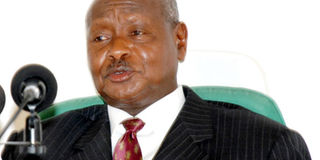Museveni draws fire over bail vote

President Museveni
President Museveni’s threat to call a referendum on his proposal to scrap the constitutional right to bail for specific offences yesterday drew criticism from human rights activists and the law fraternity outraged by what they say is an attack on the fundamental freedoms of Ugandans.
While meeting ruling party MPs at State House, Entebbe, on Monday night, Mr Museveni said he will call a public vote on bail if Parliament, where the proposal has been met with some resistance, rejects his wishes.
Mr Museveni wants people accused of participating in protests, riots, engaging in economic sabotage, treason, rape, murder and defilement to be held for not less than 180 days (six months) before they can be granted bail.
Article 23(6) of the Constitution, however, provides for the right of suspects to apply for bail which court may grant on such conditions as it considers reasonable.
Yesterday, the Uganda Law Society (ULS), which has a statutory mandate to “protect and assist the public in Uganda on all matters touching, ancillary or incidental to the law”, advised against the course of action proposed by the President.
The society’s president, Mr James Mukasa Sebugenyi, said: “As ULS, we maintain that granting of bail should remain a judicial discretion under the current legal regime and precedents.”
Mr Sebugenyi warned that enacting laws targeted at specific citizens would contravene the basic tenets of the rule of law. If a referendum is called over this matter, Mr Sebugenyi said, it would test the fabric of constitutionalism in the country.
The proposal, which has also been criticised for its apparent assault on the crucial principle of presumption of innocence, is also viewed as a ploy to punish Mr Museveni’s political opponents and a direct attack on the constitutional guarantees to protect inherent human rights and freedoms.
Mr Livingstone Ssewanyana, the executive director, Foundation for Human Rights Initiative, said they would challenge Mr Museveni’s proposal in court if it ever became law.
“Such matters should be left to the Judiciary. It is not right for politicians to meddle in the country’s Constitution,” Mr Ssewanyana said. “The right to bail must be maintained,” Mr Ssewanyana said, adding that bail does not mean that a person is acquitted.
He added: “The referendum would be a good idea” as it would “let Ugandans decide if they want to be enslaved by such an unconstitutional move”. Ms Maria Burnett, the Human Rights Watch senior researcher, Africa Division, said: “The presumption of innocence is the very foundation of any criminal justice system. Denying the right to a bail hearing would seriously undermine Uganda’s reputation internationally. Rather, police should ensure they have credible evidence of wrongdoing and seek prompt trials.”
Mr Ssewanyana had indicated that attempts to undermine this fundamental right will leave Ugandans unprotected. Article 29 of the 1995 Constitution protects the right to freedom of association, expression, conscience, peaceful assembly and demonstration and movement, among others.
Jailing peaceful protestors, Mr Ssewanyana said, would contravene this provision.
“It would also mean that Ugandans will not have a right to express themselves on policies they do not agree on,” he added.
In addition, Article 20(1) of the Universal Declaration of Human Rights to which Uganda is signatory, states that proclaims the freedom to peaceful assembly.
Uganda as a signatory is also obliged to uphold Article 21 of the International Covenant on Civil and Political Rights which states: “The right of peaceful assembly shall be recognised. No restrictions may be placed on the exercise of this right other than those imposed in conformity with the law and which are necessary in a democratic society.”




